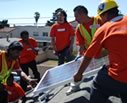Getting Your Green Collar Job
Here at Green For All, we get more than one thousand calls each month from people looking to find green-collar jobs, or hire green-collar workers. We’ve set up this page to help those people connect with each other. Below, you will find two sections of resources — one for green job postings, and one for green jobs training.
Best of luck with your search!
What is a green job? What is a green-collar job? What is the difference?
People sometimes confuse the terms green job and green-collar job. ‘Green job’ refers to any job that contributes to preserving or enhancing environmental quality.Green For All believes green-collar jobs are well-paid, career track jobs that contribute directly to preserving or enhancing environmental quality. If a job improves the environment, but doesn’t provide a family-supporting wage or a career ladder to move low-income workers into higher-skilled occupations, it is not a green-collar job.
Finding and Posting Green-Collar Jobs
Check out these great websites that post and list green jobs. You might see a lot of green job listings that require advance degrees, but all of these sites list green-collar jobs as well.
These websites are also good sources of green-collar job postings:
Resources for Green-Collar Jobs Training
Click on the categories below to see more information about them. When choosing a training program, it is important to find one that is connected to employment opportunities and is not too expensive. The most important thing is getting steady work once you complete your program.
 One-Stop Career Centers are regional service organizations that help you assess your skills, explore your career options, and apply for apprenticeships and jobs. These centers are all over the United States. Contact your local One-Stop Career Center and ask them how they can link you to trainings and opportunities for green-collar jobs. This website lets you search One-Stop Career Centers by location: http://www.servicelocator.org
One-Stop Career Centers are regional service organizations that help you assess your skills, explore your career options, and apply for apprenticeships and jobs. These centers are all over the United States. Contact your local One-Stop Career Center and ask them how they can link you to trainings and opportunities for green-collar jobs. This website lets you search One-Stop Career Centers by location: http://www.servicelocator.org
 Community Colleges are excellent sources of job training and education. Contact your local community college and ask if it has green jobs training programs or related classes. This website lists all community colleges by state and links to their individual websites: http://www.utexas.edu/world/comcol/state/
Community Colleges are excellent sources of job training and education. Contact your local community college and ask if it has green jobs training programs or related classes. This website lists all community colleges by state and links to their individual websites: http://www.utexas.edu/world/comcol/state/
 Certified Job Training Programs are approved by your local Workforce Investment Board and funded by the federal government’s ‘Workforce Investment Act of 1998.’ Not all of these training programs are related to clean energy and conservation, but some are. This website lets you search for these government-approved training programs by region: www.careeronestop.org/WiaProviderSearch.asp
Certified Job Training Programs are approved by your local Workforce Investment Board and funded by the federal government’s ‘Workforce Investment Act of 1998.’ Not all of these training programs are related to clean energy and conservation, but some are. This website lets you search for these government-approved training programs by region: www.careeronestop.org/WiaProviderSearch.asp
 Apprenticeships are programs that provide on-the-job training for trades. Federal guidelines ensure that apprenticeships include enough training and instruction. Contact your state or regional apprenticeship offices and ask them about green-collar apprenticeships.This is the US Department of Labor’s web page about apprenticeships in energy: http://www.careervoyages.gov/energy-apprenticeshipws.cfmThis website that links you to state apprenticeship websites where you can search for apprenticeship opportunities: http://www.doleta.gov/OA/sainformation.cfmThis website has contact information for the US Department of Labor’s Regional Offices of Apprenticeship: http://www.doleta.gov/OA/regdirlist.cfm
Apprenticeships are programs that provide on-the-job training for trades. Federal guidelines ensure that apprenticeships include enough training and instruction. Contact your state or regional apprenticeship offices and ask them about green-collar apprenticeships.This is the US Department of Labor’s web page about apprenticeships in energy: http://www.careervoyages.gov/energy-apprenticeshipws.cfmThis website that links you to state apprenticeship websites where you can search for apprenticeship opportunities: http://www.doleta.gov/OA/sainformation.cfmThis website has contact information for the US Department of Labor’s Regional Offices of Apprenticeship: http://www.doleta.gov/OA/regdirlist.cfm
 Labor Union Apprenticeships generally offer higher wages and standards than those that aren’t union-run. Admission to these apprenticeships is competitive. Easing this bottleneck is one of the reasons Green For All works so hard to create more good union jobs. Historically, unions have been one of the few places where everyday people can move into dignified, middle-class careers. Contact your local trade unions and ask them about apprenticeship programs related to clean energy and construction. Encourage them to support green-collar programs for people with little access to education.This is a website for the AFL-CIO’s Building & Construction Trades Department: www.buildingtrades.org
Labor Union Apprenticeships generally offer higher wages and standards than those that aren’t union-run. Admission to these apprenticeships is competitive. Easing this bottleneck is one of the reasons Green For All works so hard to create more good union jobs. Historically, unions have been one of the few places where everyday people can move into dignified, middle-class careers. Contact your local trade unions and ask them about apprenticeship programs related to clean energy and construction. Encourage them to support green-collar programs for people with little access to education.This is a website for the AFL-CIO’s Building & Construction Trades Department: www.buildingtrades.org
 Pre-Apprenticeship Programs provide life skills, basic construction skills, and OSHA safety training in addition to academic preparation for the entry exams required to enter apprenticeship programs. There are no national or local standards on what program can call itself a “pre-apprenticeship program,” so do your homework. Make sure the any program you enter will offer you the skills and training you seek. Pre-apprenticeship programs vary greatly. Community-based groups, community colleges and training partnerships are just some of the many types of organizations that offer apprenticeship preparation. Do a quick google search for “pre-apprenticeship,” plus your state or region.
Pre-Apprenticeship Programs provide life skills, basic construction skills, and OSHA safety training in addition to academic preparation for the entry exams required to enter apprenticeship programs. There are no national or local standards on what program can call itself a “pre-apprenticeship program,” so do your homework. Make sure the any program you enter will offer you the skills and training you seek. Pre-apprenticeship programs vary greatly. Community-based groups, community colleges and training partnerships are just some of the many types of organizations that offer apprenticeship preparation. Do a quick google search for “pre-apprenticeship,” plus your state or region.
 Training Programs for Youth are also great ways to prepare for a green-collar career! If you are 16-25 years old (give or take), check out these programs:
Training Programs for Youth are also great ways to prepare for a green-collar career! If you are 16-25 years old (give or take), check out these programs:
The Corps Network website is the hub for all ‘Service and Conservation Corps’ programs nationwide. These Corps serve as work training programs for youth ages 16-25. http://www.nascc.org/index.php?option=com_content&view=article&id=81:corps-by-state&catid=35:the-corps&Itemid=61
YouthBuild USA is a network of 226 local YouthBuild programs. In these programs, low-income young people ages 16–24 work toward their high school diploma or equivalency while learning job skills by building affordable housing for homeless and low-income people. YouthBuild places a strong emphasis on leadership development and community service.
Job Corps is a free education and training program that helps young people prepare for careers, earn high school diplomas or GEDs, and find and keep good jobs. Job Corps does not yet offer a wealth of green-collar training, but many local Job Corps centers are looking to add green-collar jobs training. Ask your local center if it provides such training. If it doesn’t, encourage it to start.
http://www.jobcorps.gov/centers.aspx
 Sector-Specific Trainings and Certifications are often listed through the websites of national sector-specific organizations.
Sector-Specific Trainings and Certifications are often listed through the websites of national sector-specific organizations.
Check out Greener Skills, a great report on the different types of credentials and certifications that will be useful as you develop your skills for a green-collar career.
The Interstate Renewable Energy Council website has a map of training resources, listed by region. It is only a listing – similar to the Yellow Pages. It does not imply approval of the courses or providers listed, so read the information on the page telling you how to check these programs for quality: www.irecusa.org/trainingCatalog
The North American Board of Certified Energy Practitioners website has information about solar energy trainings: http://www.nabcep.org/resources/training
This website lists energy-rater training providers accredited by the Residential Energy Services Network: http://www.natresnet.org/programs/training/directory.aspx
This document lists all the training providers that Building Performance Institute has recognized for their certification exams: http://www.bpi.org/documents/BPI_Recognized_Primary_Training_Providers.pdf


